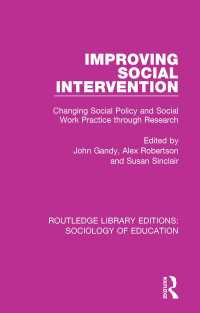Full Description
This book investigates ways 'the Other' can be both a cause of and an answer to religious and cultural fears. The multi-layered question of cultural and religious diversity has received some attention recently both in academic and policy circles. The authors of this work address this issue by focusing on fears and phobias, and the ways they are historically and sociologically produced and reproduced in a Global Era. The volume presents examples of fears related to different cultures and religions from a multidisciplinary perspective. Some of these have been provoked or sublimated by religious fundamentalisms, and a double ignorance, that is, ignorance of and about fundamentalisms, which have helped feed these collective concerns. Through a sample of stereotypes, mystifications and simplifications, the authors look at Islam as a focal lens for showing the current power of globalized collective fears. The collection also explores possible cultural antidotes to these phobias, such as the need for awareness and familiarity with diversities, based on an education accepting of interculturality and plural citizenship. The book will be essential reading for academics, researchers and policy-makers working in the areas of Intercultural Pedagogy, History, Anthropology and Sociology of Religions, Law and Religion, Contemporary Islam, Migration Studies, Interreligious Dialogue, and Ethnography.
Contents
Introduction. (Gennaro Gervasio, Maria Chiara Giorda and Paola Perucchini) 1. Fear in Western societies? An historical approach to Occidental construction of the "fear" (Manfredi Merluzzi) 2. Religious fear in Greek antiquity: Plutarch's On Superstition (Massimo Giuseppetti) 3. Fearful new world (Manlio Graziano) 4. From Lampedusa to Kassel: Migration, art and the ruins of Europe (Iain Chambers) 5. White mythologies in the Mediterranean: Mobility as a tool for dismantling Eurocentric static geographies (Gabriele Proglio) 6. Migration, Islam, and demographic fears: The narrative of replacement in Italian politics (Alberta Giorgi) 7. Becoming a refugee: Ethnographic notes from a church asylum case in Germany (Carmen Becker) 8. Displaced populations as other: a learning approach to contrast fears and promote human rights (Paola Perucchini, Sara Gabrielli and Bryan McCormack) 9. Intercultural education: why it is necessary, its characteristics and its objectives (Marco Catarci and Massimiliano Fiorucci) 10. Shout out/Shut up! (Isabella De Paolis, Gennaro Gervasio and Maria Chiara Giorda)







